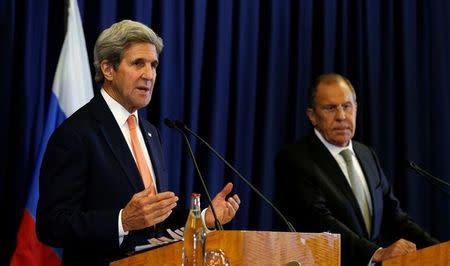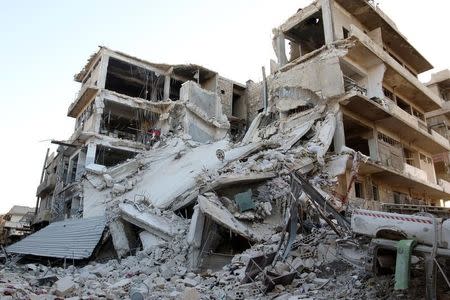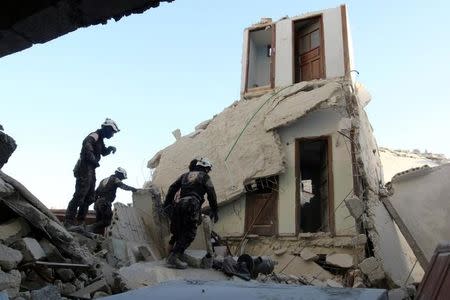U.S. seeks regional path to Syria peace at Lausanne talks
By Alexander Winning and Lesley Wroughton LAUSANNE, Switzerland (Reuters) - Syria talks with a fresh format but few fresh ideas opened in the Swiss lakeside town of Lausanne on Saturday, with U.S. Secretary of State John Kerry seeking a new path to peace after failing to secure a ceasefire in direct talks with Russia. Kerry hosted Russian Foreign Minister Sergei Lavrov and seven foreign ministers from the region - from Iran, Iraq, Saudi Arabia, Turkey, Qatar, Jordan and Egypt - three weeks after the collapse of a painstakingly crafted U.S.-Russian ceasefire plan that many saw as the last hope for peace this year. Lavrov has said he has "no special expectations" for Saturday's meeting. A senior U.S. State Department official said he foresaw no major announcement at the end of the day. "This is going to be, as it has been now for several years, a very difficult process," the U.S. official said. Europe is not represented at the meeting being held in a luxury hotel on Lake Geneva. But France's Foreign Ministry confirmed that foreign ministers of like-minded nations plan to meet to discuss Syria in London on Sunday. Since the breakdown of U.S.-Russia cooperation, long the backbone of efforts to end the war in Syria, U.S. officials have worked on a number of ideas, and although no breakthrough is expected, the regional format could be the basis of a new process, the U.S. official said. A Western diplomat in Lausanne said the meeting appeared ill-prepared and vague in its goals, and the list of invitees clarified only at the last moment. "If it is to reach an agreement on Aleppo, countries have to make commitments: Russia to stop bombing, Iran to withdraw its militia on the ground supporting Damascus" the diplomat told Reuters. "That is a lot to obtain in half a day. Especially when people who are arriving are not happy with the format of the talks," he said. "If this format is to be credible, Kerry has to come out of the talks tonight saying we got something for Aleppo. A ceasefire would be credible." Before the talks started, Kerry met separately with his Saudi counterpart Adel al-Jubeir and with Lavrov to discuss the logistics of the meeting. It was the first meeting between Kerry and Lavrov since the collapse of a second attempted ceasefire in September. The U.S. is expected to once again push Russia to agree to a ceasefire in Aleppo, and Russia is seen as insisting on separating moderate opposition groups from those it considers terrorists. ACCUSATIONS Pressure is rising for a halt to a ferocious, three-week-old Syrian government offensive to capture the rebel-held eastern zone of the city of Aleppo, where the United Nations says 275,000 civilians still live and 8,000 rebels are holding out against Syrian, Russian and Iranian-backed forces. Western powers have accused Russia and Syria of committing atrocities by bombing hospitals, killing civilians and preventing medical evacuations, as well as targeting an aid convoy with the loss of around 20 lives. Syria and Russia counter that they are only targeting militants in Aleppo and accuse the United States of breaking the ceasefire by bombing scores of Syrian troops fighting Islamic State insurgents, over which the United States has expressed regret. A senior rebel commander said on Friday that Syrian government forces would never be able to capture Aleppo's eastern sector, but a military source said the operation was going as planned. The United Nations has said food, fuel and medicine are running out in eastern Aleppo and there will be no rations to distribute from the start of next month. In a gesture of apparent desperation, U.N. Syria peace envoy Staffan de Mistura has offered to escort members of an Islamist militant group, Jabhat Fateh al-Sham, out of Aleppo if that would entice Damascus to forge a ceasefire with the remaining rebels. Russia's Deputy Foreign Minister Gennady Gatilov said Russia wants to discuss de Mistura's offer, as well as elements of last month's failed truce deal, namely humanitarian aid deliveries and a pullout of both sides' troops from the Castello Road, a key supply route, he told Interfax news agency. (Additional reporting by Stephanie Nebehay, Marina Depetris, John Irish and David Alexander; Writing by Tom Miles; Editing by Hugh Lawson and Mark Heinrich)





